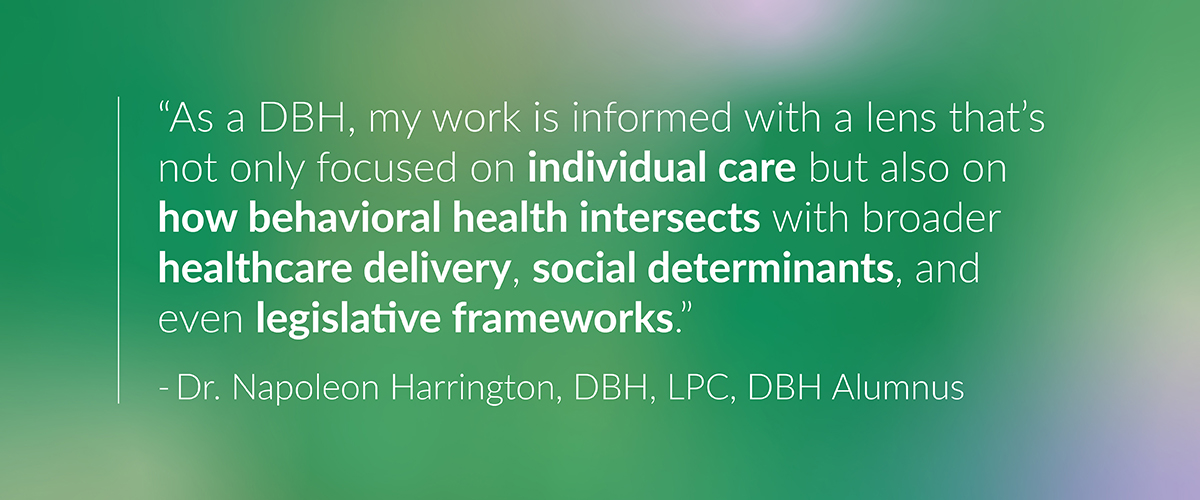 CGI alumnus strengthens voice for behavioral health at the state level.
CGI alumnus strengthens voice for behavioral health at the state level.
 Cummings Graduate Institute for Behavioral Health Studies proudly celebrates DBH program alumnus, Dr. Napoleon Harrington, DBH, LPC, on his reappointment to the Michigan Board of Counseling by Governor Gretchen Whitmer. Serving as Vice Chair, Dr. Harrington continues to represent licensed professional counselors in a regulatory capacity while highlighting the dynamic contributions of Doctor of Behavioral Health professionals to the field.
Cummings Graduate Institute for Behavioral Health Studies proudly celebrates DBH program alumnus, Dr. Napoleon Harrington, DBH, LPC, on his reappointment to the Michigan Board of Counseling by Governor Gretchen Whitmer. Serving as Vice Chair, Dr. Harrington continues to represent licensed professional counselors in a regulatory capacity while highlighting the dynamic contributions of Doctor of Behavioral Health professionals to the field.
“Being reappointed to the Michigan Board of Counseling by Governor Gretchen Whitmer is both a profound honor and a personal affirmation of the values I hold as a behavioral health professional,” Dr. Harrington shared. “Personally, I’m proud to add to my story reaching a meaningful milestone in my career that brings my family, friends and colleagues pride. Their support and love grounds me, and that sense of being grounded reinforces my belief in service, integrity, and the importance of shaping systems that reflect compassion and equity. As the Vice Chair of the Michigan Board of Counseling, professionally, it’s a testament to the trust placed in my clinical judgment, policy insight, and commitment to advancing the counseling profession. It deepens my responsibility to uphold ethical standards, advocate for inclusive practices, and ensure that our field continues to evolve in ways that meet the complex needs of our growing communities.”
Dr. Harrington credits his Doctor of Behavioral Health education with enhancing his work at the Board.
“My Doctor of Behavioral Health education has been instrumental in shaping how I approach board service. It equipped me with a systems-level perspective that integrates clinical expertise with population health, policy analysis, and interprofessional collaboration. As a DBH, my work is informed with a lens that’s not only focused on individual care but also on how behavioral health intersects with broader healthcare delivery, social determinants, and even legislative frameworks. This training allows me to evaluate regulatory decisions through both a clinical and strategic lens, ensuring that our policies are not only ethical but also scalable, sustainable, and responsive to emerging challenges.”
When asked what advice he has for other behavioral health professionals seeking to make an impact in public service or policy work, Dr. Harrington offered this encouragement:
“Never underestimate the power of being involved. My career is a testament to being interested in a topic at the seemingly right place and right time. I’ve learned that there will be opportunities to get engaged, and you will have to make a decision about whether or not your voice on the subject matters. In fact, you learn that your voice absolutely matters. Start by recognizing that your clinical voice is a powerful tool for systemic change. DBH’s bring a unique understanding of medical literacy, entrepreneurship, social determinants of health, human behavior, and other discussions that are desperately needed in policy conversations.”
He also urges colleagues to “stay informed… build relationships… lead with purpose… and don’t wait for permission.” As he explains, “The time is always now to make an impact in your respective area of interest. You don’t need to be a policy expert to make a difference. I’m not. By being willing to step in and speak up at a critical time, I have been fortunate enough to stand alongside some legends of the profession to turn House Bills into Michigan Legislation.”
Dr. Harrington sums up his mission simply, that
“public service is not just about governance, it’s about stewardship. And our field needs more stewards who understand both the science of healing and the art of advocacy. I am grateful for the opportunity to serve.”






























